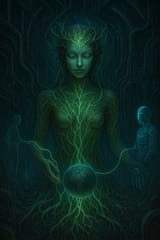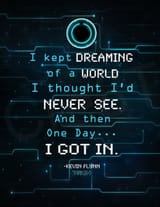>>40579334I read your dialogue more carefully,
so I'd like to add something else,
hopefully closer to what you were asking me.
The reason I assume that the brain is hosting an experience AND hosting an experiencING, is because...
When our eyeballs detect light data (sense-obects), we convert that into sensing.
So, I see dreams as the exact same.
Our senses are picking up sense-objects.
That is the actual experience of a dream, true?
In a dream, you are seemingly sensing sense-objects.
So, in my perspective, in the model 1 which suggests the brain creates the dream, our brain is hosting both the sense-objects (in a simulation) and the sensing of those sense-objects.
My question is,
WHERE is the light, that our eyes seemingly percieve, during a dream?
Does it come from inside of our heads?
Is there a tiny powered television screen within our heads, which hosts sense-objects?
When we see the real world, we are seeing actual sense-objects, so what differentiates are percieving of the real world, from our percieving of a dreamworld?
In experience, both scenarios share an identical framework, cus', in experience, both in real life, and in a dream, we consider everything to be real, and to have a consistent logic (or physics).
When you wake up from the dream,
you consider that the logic and physics of the dream was nonsense, in comparison to the logic and physics of this real life,
but,
while experiencing the dream,
the logic and physics of that dream is consistent within itself, to the dreamer,
so the dreamer takes the dream to be reality,
during the duration of the dream.
This is why I'm assuming that the brain is both hosting the sensing and the sense-objects,
cus', I assume the same thing for real life.
I assume that real life is an external world of sense-objects, which I am sensing.
To argue otherwise, would be solipsism, the belief that only one's own mind exists, and all else is illusion.
I'd rather not be talking to myself here Lol.
Ya'll exist.

